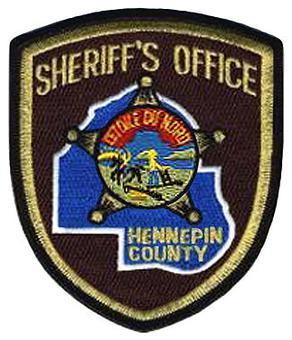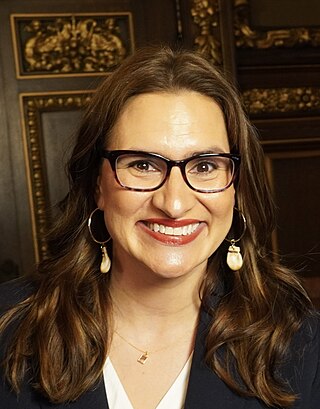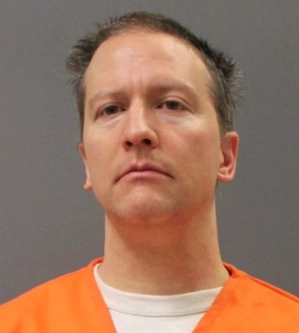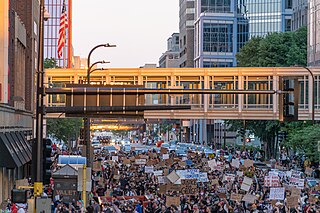Related Research Articles

The Minneapolis Police Department (MPD) is the primary law enforcement agency in Minneapolis, Minnesota, United States. It is also the largest police department in Minnesota. Formed in 1867, it is the second-oldest police department in Minnesota, after the Saint Paul Police Department that formed in 1854. A short-lived Board of Police Commissioners existed from 1887 to 1890.

The Hennepin County Sheriff's Office (HCSO) is the sheriff's office for Hennepin County in the U.S. state of Minnesota. HCSO's main offices are in Minneapolis City Hall in the county seat of Minneapolis.

Nekima Valdez Levy Armstrong is an American lawyer and social justice activist. She was president of the Minneapolis chapter of the NAACP from 2015 to 2016. She has led a variety of organizations that focus on issues of racial equality and disparity in the Minneapolis–Saint Paul area.

Peggy Flanagan is an American politician, community organizer, and Native American activist serving as the 50th lieutenant governor of Minnesota since 2019. A member of the Minnesota Democratic–Farmer–Labor Party (DFL), Flanagan served in the Minnesota House of Representatives from 2015 to 2019.

Jacob Lawrence Frey is an American politician and attorney who has served as the mayor of Minneapolis, Minnesota since 2018. A member of the Minnesota Democratic–Farmer–Labor Party, he served on the Minneapolis City Council from 2014 to 2018.

Aisha Gomez is an American politician serving in the Minnesota House of Representatives since 2019. A member of the Minnesota Democratic–Farmer–Labor Party (DFL), Gomez represents District 62A, which includes parts of Minneapolis in Hennepin County, Minnesota.
The Minnesota Spokesman–Recorder is an African-American, English-language newspaper headquartered in Minneapolis, Minnesota and serves readers in the Twin Cities. Founded in 1934 by Cecil Earle Newman, it is the oldest continuously operated black newspaper and longest-lived black-owned business in Minnesota. The current CEO of the paper is Newman's granddaughter, Tracey Williams-Dillard. The current editor is Mel Reeves.

On May 25, 2020, George Floyd, a 46-year-old black American man, was murdered in Minneapolis by Derek Chauvin, a 44-year-old white police officer. Floyd had been arrested after a store clerk alleged that he made a purchase using a counterfeit $20 bill. Chauvin knelt on Floyd's neck for over nine minutes while Floyd was handcuffed and lying face-down in a street. Two other police officers, J. Alexander Kueng and Thomas Lane, assisted Chauvin in restraining Floyd. Lane had also pointed a gun at Floyd's head before Floyd was handcuffed. A fourth police officer, Tou Thao, prevented bystanders from intervening.

Derek Michael Chauvin is a former police officer who murdered George Floyd, a 46-year-old African-American man, in Minneapolis, Minnesota. On May 25, 2020, Chauvin knelt on Floyd's neck for over nine minutes while Floyd was handcuffed and lying face down on the street, calling out "I can't breathe", during an arrest made with three other officers. Chauvin was dismissed by the Minneapolis Police Department (MPD) on May 26 and arrested on May 29. The murder set off a series of protests in Minneapolis–Saint Paul and across the rest of the United States, later spreading around the world.

The George Floyd protests were a series of police brutality protests that began in Minneapolis in the United States on May 26, 2020. The civil unrest and protests began as part of international reactions to the murder of George Floyd, a 46-year-old African American man, during an arrest. Derek Chauvin, a Minneapolis Police Department officer, knelt on Floyd's neck for 9 minutes and 29 seconds as three other officers looked on and prevented passers-by from intervening. Chauvin and the other three officers involved were later arrested. In April 2021, Chauvin was found guilty of second-degree murder, third-degree murder, and second-degree manslaughter. In June 2021, Chauvin was sentenced to 22+1⁄2 years in prison.
The following is a timeline of race relations and policing in Minneapolis–Saint Paul, providing details with a history of policing in the Twin Cities in the U.S. state of Minnesota from the nineteenth century to the present day. The Hennepin County Sheriff's Office, with its headquarters in downtown Minneapolis, is one of the "largest law enforcement agencies in Minnesota" with division and unit facilities throughout Hennepin County. Twin cities, Saint Paul and Minneapolis, have their own police departments, the Minneapolis Police Department, which was established in 1867 and the Saint Paul Police Department. A union for rank and file officers in Minneapolis—the Police Officers Federation of Minneapolis —was established in 1917.

Local protests over the murder of George Floyd, sometimes called the Minneapolis riots or Minneapolis uprising, began on May 26, 2020, and within a few days had inspired a global protest movement against police brutality and racial inequality. The initial events were a reaction to a video filmed the day before and circulated widely in the media of police officer Derek Chauvin kneeling on Floyd's neck for 9 minutes and 29 seconds while Floyd struggled to breathe, begged for help, lost consciousness, and died. Public outrage over the content of the video gave way to widespread civil disorder in Minneapolis, Saint Paul, and other cities in the Minneapolis–Saint Paul metropolitan area over the five-day period of May 26 to 30 after Floyd's murder.

A wave of civil unrest in the United States, initially triggered by the murder of George Floyd during his arrest by Minneapolis police officers on May 25, 2020, led to protests and riots against systemic racism in the United States, such as in the form of police violence and other forms of violence. Since then, numerous other incidents of police brutality have drawn continued attention and unrest in various parts of the country.

As a reaction to the murder of George Floyd on May 25, 2020, racial justice activists and some residents of the Powderhorn community in Minneapolis staged an occupation protest at the intersection of East 38th Street and Chicago Avenue with a blockade of the streetway lasting over a year. The street intersection is where Derek Chauvin, a White police officer with the Minneapolis Police Department, murdered George Floyd, an unarmed 46-year-old Black man. Activists erected barricades to block vehicular traffic and transformed the street intersection and surrounding structures with amenities, social services, and public art of Floyd and that of other racial justice themes. The community referred to the unofficial memorial and protest zone at the street intersection as "George Floyd Square". The controversial street occupation in 2020 and 2021 was described as an “autonomous” zone and a "no-go" place for police, but local officials disputed the extent of such characterizations.
State of Minnesota v. Derek Michael Chauvin was an American criminal case in the District Court of Minnesota in 2021. Former Minneapolis police officer Derek Chauvin was tried and convicted for the murder of George Floyd, which occurred during an arrest on May 25, 2020, and led to global protests over racial injustice and police brutality. A 12-member jury found Chauvin guilty of unintentional second-degree murder, third-degree murder, and second-degree manslaughter. It was the first conviction of a white police officer in Minnesota for the murder of a black person.

Protests and civil disorder occurred in reaction to the killing of Daunte Wright on April 11, 2021. Wright, a 20-year-old Black man, was fatally shot by police officer Kimberly Potter during a traffic stop in Brooklyn Center, Minnesota, United States. Protests that first began in Brooklyn Center spread to other locations in the Minneapolis–Saint Paul metropolitan area and then to other cities in the United States. Several nights of civil disorder in Brooklyn Center and adjacent cities resulted in sporadic looting and damage to a few hundred properties, including four businesses that were set on fire.

In 2020 and 2021, several protests were held in the U.S. city of Minneapolis that coincided with judicial proceedings and the criminal trial of Derek Chauvin. As an officer with the Minneapolis Police Department, Chauvin was charged with the murder of George Floyd, an unarmed African American man who died during an arrest incident on May 25, 2020. A bystander's video captured Chauvin kneeling on Floyd's neck for over nine minutes while Floyd struggled to breathe, lost consciousness, and died. Protesters opposed Chauvin's pre-trial release from jail on bail in October 2020. In the lead up to and during the criminal trial in early 2021, demonstrators sought conviction and maximum sentencing for Chauvin, and the enactment of police reform measures.

George Floyd Square, officially George Perry Floyd Square, is the commemorative street name for the section of Chicago Avenue in the U.S. city of Minneapolis from East 37th Street to East 39th Street. It is named after George Floyd, a Black man who was murdered there by Minneapolis police officer Derek Chauvin on May 25, 2020. The streetway and memorial site is centered at the 38th and Chicago intersection.

Jerry Wayne Blackwell is an American lawyer who serves as a United States district judge of the United States District Court for the District of Minnesota. Before becoming a judge, he was one of the prosecutors in the trial of Derek Chauvin for the murder of George Floyd.

In the early 2020s, the Minneapolis–Saint Paul metropolitan area in U.S. state of Minnesota experienced a wave of civil unrest, comprising peaceful demonstrations and riots, against systemic racism toward black Americans, notably in the form of police violence. A number of events occurred, beginning soon after the murder of George Floyd, an unarmed black man, by a white Minneapolis police officer on May 25, 2020. National Public Radio characterized the events as cultural reckoning on topics of racial injustice.
References
- 1 2 Forgrave, Reid; Rao, Maya (11 April 2021). "Conviction of Derek Chauvin: A moment of victory amid a history of injustice". Star Tribune . Retrieved 2021-09-29.
- 1 2 Williams, Brandt (21 January 2005). "Activist Spike Moss honored for activism". MPR News. Retrieved 29 September 2021.
- ↑ Grow, Doug (17 November 2015). "The vindication of Spike Moss?". MinnPost. Retrieved 29 September 2021.
- ↑ "Minneapolis man convicted in activist's grandson slaying". AP NEWS. 2021-08-16. Retrieved 2021-09-29.
- ↑ Scullin, Karen (16 June 2020). "Civil rights activist Spike Moss calls out Minneapolis City Council over inaction". FOX 9. Retrieved 29 September 2021.
- 1 2 "Comcast Honors Minnesota Civil Rights Champions". Comcast Twin Cities Region. 5 October 2018. Retrieved 29 September 2021.
- 1 2 Furst, Randy (5 August 2016). "Founders and supporters celebrate The Way's 50th anniversary". Star Tribune. Retrieved 29 September 2021.
- ↑ Paulsen, Sarah (2018). Black Power And Neighborhood Organizing In Minneapolis, Minnesota: The Way Community Center, 1966-1971 (MA thesis). University of South Carolina.
- ↑ "'The Way' Community Center, (Minneapolis) Opens". African American Registry.
- ↑ Williams, Brandt (25 September 2002). "Ten years after: Tensions remain". Minnesota Public Radio. Retrieved 29 September 2021.
- ↑ Collins, Bob (26 September 2017). "A Minneapolis cop was executed 25 years ago". MPR NewsCut. Retrieved 29 September 2021.